Analysis of IT Ethics in the Willis Project Case Study
VerifiedAdded on 2022/09/16
|9
|1971
|19
Report
AI Summary
This report delves into the ethical considerations within the Willis project, a case study involving a junior developer's unauthorized changes to a project, creating conflict among team members and the client. The report identifies the core ethical dilemma arising from the lack of communication and adherence to project protocols. It analyzes the situation through the lens of the ACS Code of Professional Conduct, evaluating the actions of the IT professionals involved, including the junior developer, project manager, and project director. The analysis highlights the importance of ethical decision-making, communication, and adherence to professional standards. The report also offers recommendations for resolving the ethical dilemma, emphasizing the need for proper communication, transparency, and adherence to established procedures to prevent project failures and maintain client satisfaction. The conclusion stresses the significance of ethical practices in information technology to ensure responsible technology usage and effective governance.
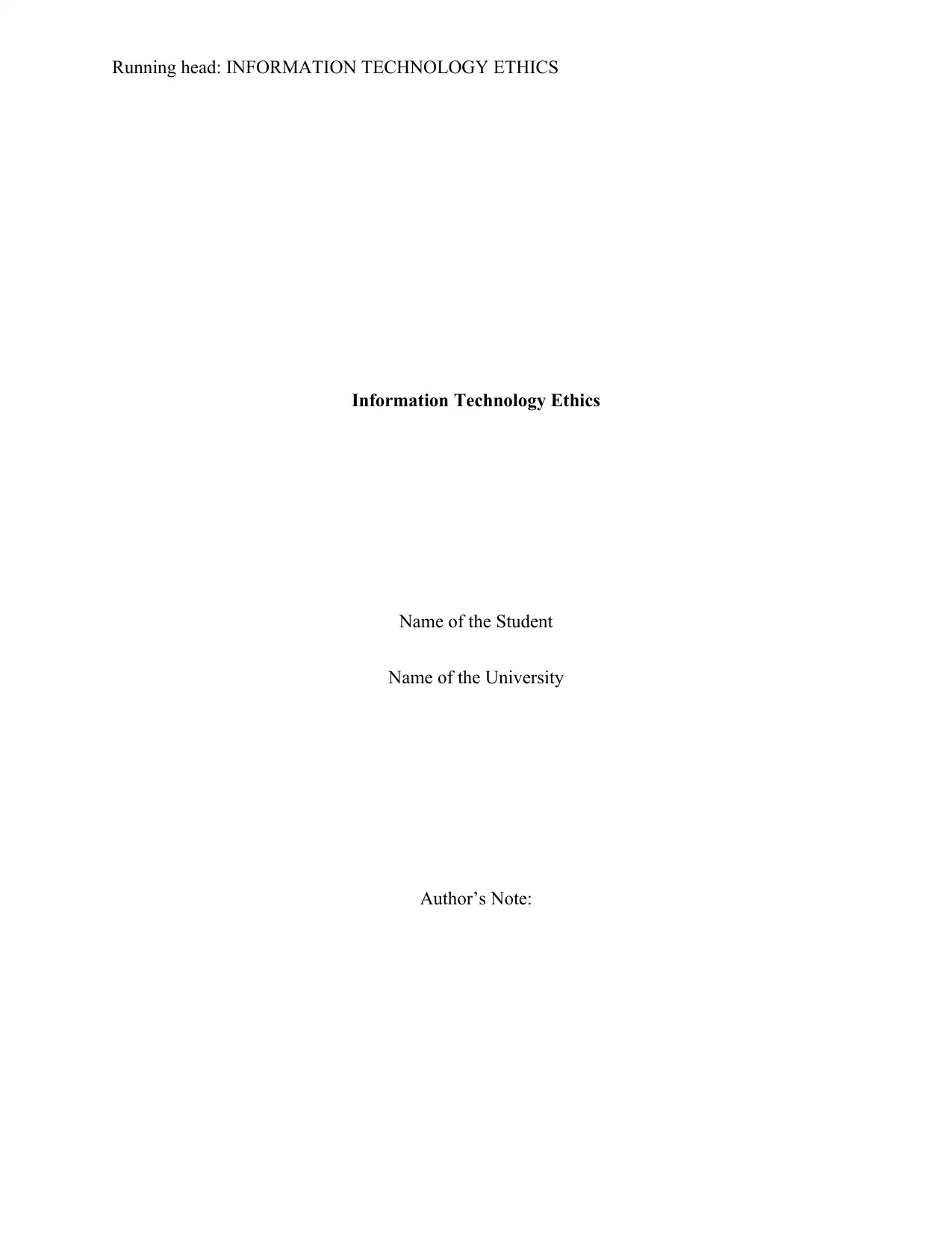
Running head: INFORMATION TECHNOLOGY ETHICS
Information Technology Ethics
Name of the Student
Name of the University
Author’s Note:
Information Technology Ethics
Name of the Student
Name of the University
Author’s Note:
Paraphrase This Document
Need a fresh take? Get an instant paraphrase of this document with our AI Paraphraser
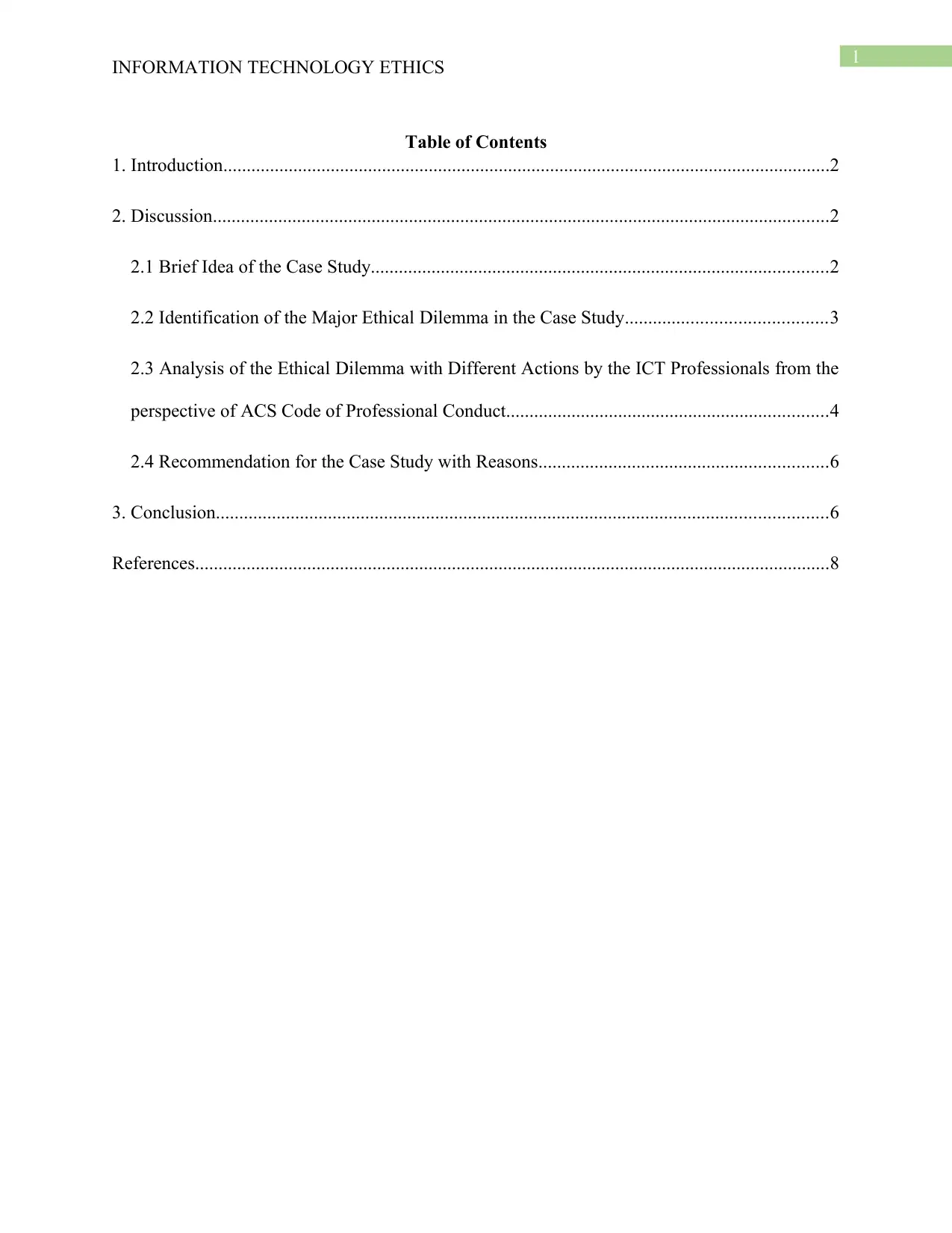
1
INFORMATION TECHNOLOGY ETHICS
Table of Contents
1. Introduction..................................................................................................................................2
2. Discussion....................................................................................................................................2
2.1 Brief Idea of the Case Study..................................................................................................2
2.2 Identification of the Major Ethical Dilemma in the Case Study...........................................3
2.3 Analysis of the Ethical Dilemma with Different Actions by the ICT Professionals from the
perspective of ACS Code of Professional Conduct.....................................................................4
2.4 Recommendation for the Case Study with Reasons..............................................................6
3. Conclusion...................................................................................................................................6
References........................................................................................................................................8
INFORMATION TECHNOLOGY ETHICS
Table of Contents
1. Introduction..................................................................................................................................2
2. Discussion....................................................................................................................................2
2.1 Brief Idea of the Case Study..................................................................................................2
2.2 Identification of the Major Ethical Dilemma in the Case Study...........................................3
2.3 Analysis of the Ethical Dilemma with Different Actions by the ICT Professionals from the
perspective of ACS Code of Professional Conduct.....................................................................4
2.4 Recommendation for the Case Study with Reasons..............................................................6
3. Conclusion...................................................................................................................................6
References........................................................................................................................................8
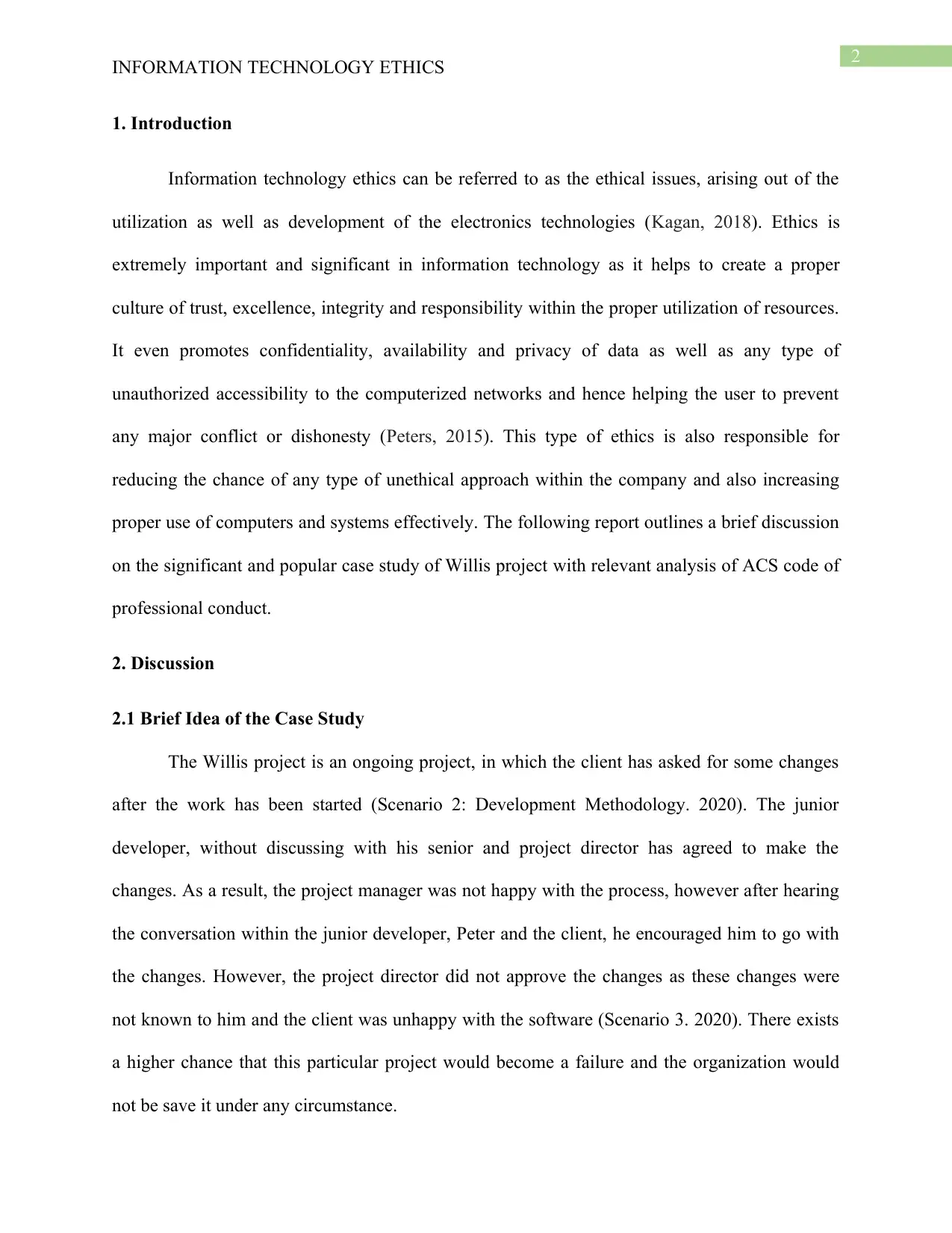
2
INFORMATION TECHNOLOGY ETHICS
1. Introduction
Information technology ethics can be referred to as the ethical issues, arising out of the
utilization as well as development of the electronics technologies (Kagan, 2018). Ethics is
extremely important and significant in information technology as it helps to create a proper
culture of trust, excellence, integrity and responsibility within the proper utilization of resources.
It even promotes confidentiality, availability and privacy of data as well as any type of
unauthorized accessibility to the computerized networks and hence helping the user to prevent
any major conflict or dishonesty (Peters, 2015). This type of ethics is also responsible for
reducing the chance of any type of unethical approach within the company and also increasing
proper use of computers and systems effectively. The following report outlines a brief discussion
on the significant and popular case study of Willis project with relevant analysis of ACS code of
professional conduct.
2. Discussion
2.1 Brief Idea of the Case Study
The Willis project is an ongoing project, in which the client has asked for some changes
after the work has been started (Scenario 2: Development Methodology. 2020). The junior
developer, without discussing with his senior and project director has agreed to make the
changes. As a result, the project manager was not happy with the process, however after hearing
the conversation within the junior developer, Peter and the client, he encouraged him to go with
the changes. However, the project director did not approve the changes as these changes were
not known to him and the client was unhappy with the software (Scenario 3. 2020). There exists
a higher chance that this particular project would become a failure and the organization would
not be save it under any circumstance.
INFORMATION TECHNOLOGY ETHICS
1. Introduction
Information technology ethics can be referred to as the ethical issues, arising out of the
utilization as well as development of the electronics technologies (Kagan, 2018). Ethics is
extremely important and significant in information technology as it helps to create a proper
culture of trust, excellence, integrity and responsibility within the proper utilization of resources.
It even promotes confidentiality, availability and privacy of data as well as any type of
unauthorized accessibility to the computerized networks and hence helping the user to prevent
any major conflict or dishonesty (Peters, 2015). This type of ethics is also responsible for
reducing the chance of any type of unethical approach within the company and also increasing
proper use of computers and systems effectively. The following report outlines a brief discussion
on the significant and popular case study of Willis project with relevant analysis of ACS code of
professional conduct.
2. Discussion
2.1 Brief Idea of the Case Study
The Willis project is an ongoing project, in which the client has asked for some changes
after the work has been started (Scenario 2: Development Methodology. 2020). The junior
developer, without discussing with his senior and project director has agreed to make the
changes. As a result, the project manager was not happy with the process, however after hearing
the conversation within the junior developer, Peter and the client, he encouraged him to go with
the changes. However, the project director did not approve the changes as these changes were
not known to him and the client was unhappy with the software (Scenario 3. 2020). There exists
a higher chance that this particular project would become a failure and the organization would
not be save it under any circumstance.
⊘ This is a preview!⊘
Do you want full access?
Subscribe today to unlock all pages.

Trusted by 1+ million students worldwide
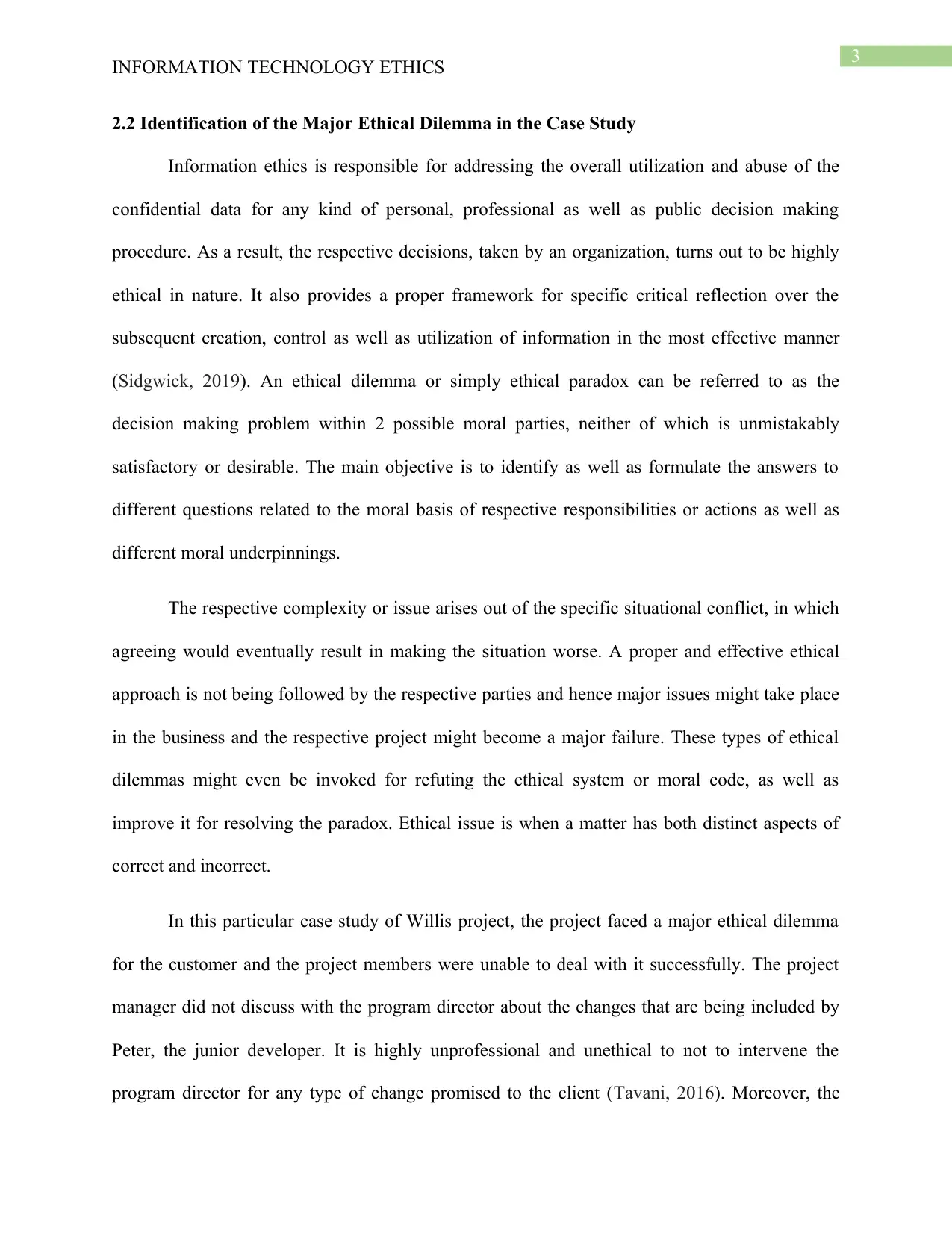
3
INFORMATION TECHNOLOGY ETHICS
2.2 Identification of the Major Ethical Dilemma in the Case Study
Information ethics is responsible for addressing the overall utilization and abuse of the
confidential data for any kind of personal, professional as well as public decision making
procedure. As a result, the respective decisions, taken by an organization, turns out to be highly
ethical in nature. It also provides a proper framework for specific critical reflection over the
subsequent creation, control as well as utilization of information in the most effective manner
(Sidgwick, 2019). An ethical dilemma or simply ethical paradox can be referred to as the
decision making problem within 2 possible moral parties, neither of which is unmistakably
satisfactory or desirable. The main objective is to identify as well as formulate the answers to
different questions related to the moral basis of respective responsibilities or actions as well as
different moral underpinnings.
The respective complexity or issue arises out of the specific situational conflict, in which
agreeing would eventually result in making the situation worse. A proper and effective ethical
approach is not being followed by the respective parties and hence major issues might take place
in the business and the respective project might become a major failure. These types of ethical
dilemmas might even be invoked for refuting the ethical system or moral code, as well as
improve it for resolving the paradox. Ethical issue is when a matter has both distinct aspects of
correct and incorrect.
In this particular case study of Willis project, the project faced a major ethical dilemma
for the customer and the project members were unable to deal with it successfully. The project
manager did not discuss with the program director about the changes that are being included by
Peter, the junior developer. It is highly unprofessional and unethical to not to intervene the
program director for any type of change promised to the client (Tavani, 2016). Moreover, the
INFORMATION TECHNOLOGY ETHICS
2.2 Identification of the Major Ethical Dilemma in the Case Study
Information ethics is responsible for addressing the overall utilization and abuse of the
confidential data for any kind of personal, professional as well as public decision making
procedure. As a result, the respective decisions, taken by an organization, turns out to be highly
ethical in nature. It also provides a proper framework for specific critical reflection over the
subsequent creation, control as well as utilization of information in the most effective manner
(Sidgwick, 2019). An ethical dilemma or simply ethical paradox can be referred to as the
decision making problem within 2 possible moral parties, neither of which is unmistakably
satisfactory or desirable. The main objective is to identify as well as formulate the answers to
different questions related to the moral basis of respective responsibilities or actions as well as
different moral underpinnings.
The respective complexity or issue arises out of the specific situational conflict, in which
agreeing would eventually result in making the situation worse. A proper and effective ethical
approach is not being followed by the respective parties and hence major issues might take place
in the business and the respective project might become a major failure. These types of ethical
dilemmas might even be invoked for refuting the ethical system or moral code, as well as
improve it for resolving the paradox. Ethical issue is when a matter has both distinct aspects of
correct and incorrect.
In this particular case study of Willis project, the project faced a major ethical dilemma
for the customer and the project members were unable to deal with it successfully. The project
manager did not discuss with the program director about the changes that are being included by
Peter, the junior developer. It is highly unprofessional and unethical to not to intervene the
program director for any type of change promised to the client (Tavani, 2016). Moreover, the
Paraphrase This Document
Need a fresh take? Get an instant paraphrase of this document with our AI Paraphraser
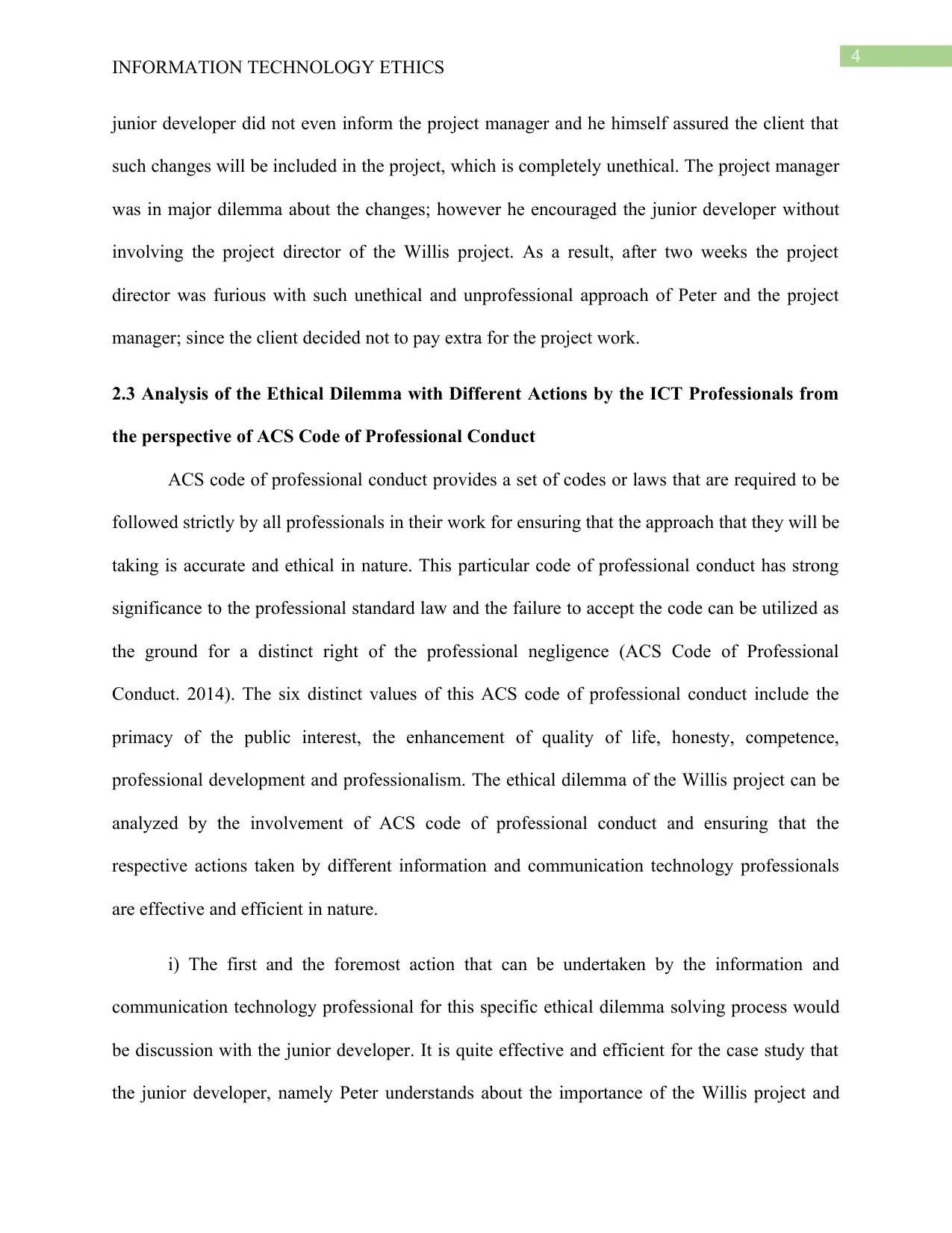
4
INFORMATION TECHNOLOGY ETHICS
junior developer did not even inform the project manager and he himself assured the client that
such changes will be included in the project, which is completely unethical. The project manager
was in major dilemma about the changes; however he encouraged the junior developer without
involving the project director of the Willis project. As a result, after two weeks the project
director was furious with such unethical and unprofessional approach of Peter and the project
manager; since the client decided not to pay extra for the project work.
2.3 Analysis of the Ethical Dilemma with Different Actions by the ICT Professionals from
the perspective of ACS Code of Professional Conduct
ACS code of professional conduct provides a set of codes or laws that are required to be
followed strictly by all professionals in their work for ensuring that the approach that they will be
taking is accurate and ethical in nature. This particular code of professional conduct has strong
significance to the professional standard law and the failure to accept the code can be utilized as
the ground for a distinct right of the professional negligence (ACS Code of Professional
Conduct. 2014). The six distinct values of this ACS code of professional conduct include the
primacy of the public interest, the enhancement of quality of life, honesty, competence,
professional development and professionalism. The ethical dilemma of the Willis project can be
analyzed by the involvement of ACS code of professional conduct and ensuring that the
respective actions taken by different information and communication technology professionals
are effective and efficient in nature.
i) The first and the foremost action that can be undertaken by the information and
communication technology professional for this specific ethical dilemma solving process would
be discussion with the junior developer. It is quite effective and efficient for the case study that
the junior developer, namely Peter understands about the importance of the Willis project and
INFORMATION TECHNOLOGY ETHICS
junior developer did not even inform the project manager and he himself assured the client that
such changes will be included in the project, which is completely unethical. The project manager
was in major dilemma about the changes; however he encouraged the junior developer without
involving the project director of the Willis project. As a result, after two weeks the project
director was furious with such unethical and unprofessional approach of Peter and the project
manager; since the client decided not to pay extra for the project work.
2.3 Analysis of the Ethical Dilemma with Different Actions by the ICT Professionals from
the perspective of ACS Code of Professional Conduct
ACS code of professional conduct provides a set of codes or laws that are required to be
followed strictly by all professionals in their work for ensuring that the approach that they will be
taking is accurate and ethical in nature. This particular code of professional conduct has strong
significance to the professional standard law and the failure to accept the code can be utilized as
the ground for a distinct right of the professional negligence (ACS Code of Professional
Conduct. 2014). The six distinct values of this ACS code of professional conduct include the
primacy of the public interest, the enhancement of quality of life, honesty, competence,
professional development and professionalism. The ethical dilemma of the Willis project can be
analyzed by the involvement of ACS code of professional conduct and ensuring that the
respective actions taken by different information and communication technology professionals
are effective and efficient in nature.
i) The first and the foremost action that can be undertaken by the information and
communication technology professional for this specific ethical dilemma solving process would
be discussion with the junior developer. It is quite effective and efficient for the case study that
the junior developer, namely Peter understands about the importance of the Willis project and
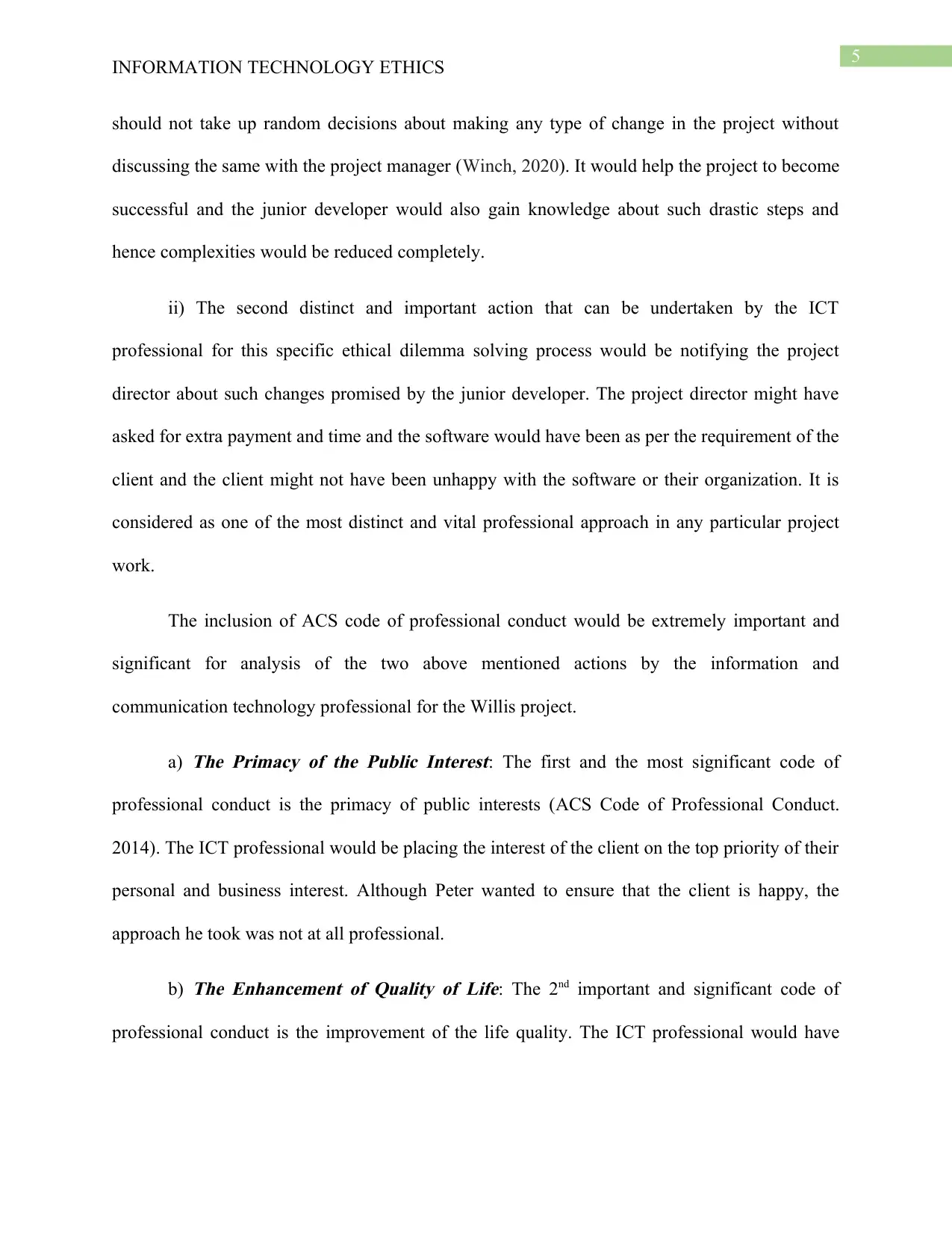
5
INFORMATION TECHNOLOGY ETHICS
should not take up random decisions about making any type of change in the project without
discussing the same with the project manager (Winch, 2020). It would help the project to become
successful and the junior developer would also gain knowledge about such drastic steps and
hence complexities would be reduced completely.
ii) The second distinct and important action that can be undertaken by the ICT
professional for this specific ethical dilemma solving process would be notifying the project
director about such changes promised by the junior developer. The project director might have
asked for extra payment and time and the software would have been as per the requirement of the
client and the client might not have been unhappy with the software or their organization. It is
considered as one of the most distinct and vital professional approach in any particular project
work.
The inclusion of ACS code of professional conduct would be extremely important and
significant for analysis of the two above mentioned actions by the information and
communication technology professional for the Willis project.
a)
The Primacy of the Public Interest: The first and the most significant code of
professional conduct is the primacy of public interests (ACS Code of Professional Conduct.
2014). The ICT professional would be placing the interest of the client on the top priority of their
personal and business interest. Although Peter wanted to ensure that the client is happy, the
approach he took was not at all professional.
b)
The Enhancement of Quality of Life: The 2nd important and significant code of
professional conduct is the improvement of the life quality. The ICT professional would have
INFORMATION TECHNOLOGY ETHICS
should not take up random decisions about making any type of change in the project without
discussing the same with the project manager (Winch, 2020). It would help the project to become
successful and the junior developer would also gain knowledge about such drastic steps and
hence complexities would be reduced completely.
ii) The second distinct and important action that can be undertaken by the ICT
professional for this specific ethical dilemma solving process would be notifying the project
director about such changes promised by the junior developer. The project director might have
asked for extra payment and time and the software would have been as per the requirement of the
client and the client might not have been unhappy with the software or their organization. It is
considered as one of the most distinct and vital professional approach in any particular project
work.
The inclusion of ACS code of professional conduct would be extremely important and
significant for analysis of the two above mentioned actions by the information and
communication technology professional for the Willis project.
a)
The Primacy of the Public Interest: The first and the most significant code of
professional conduct is the primacy of public interests (ACS Code of Professional Conduct.
2014). The ICT professional would be placing the interest of the client on the top priority of their
personal and business interest. Although Peter wanted to ensure that the client is happy, the
approach he took was not at all professional.
b)
The Enhancement of Quality of Life: The 2nd important and significant code of
professional conduct is the improvement of the life quality. The ICT professional would have
⊘ This is a preview!⊘
Do you want full access?
Subscribe today to unlock all pages.

Trusted by 1+ million students worldwide
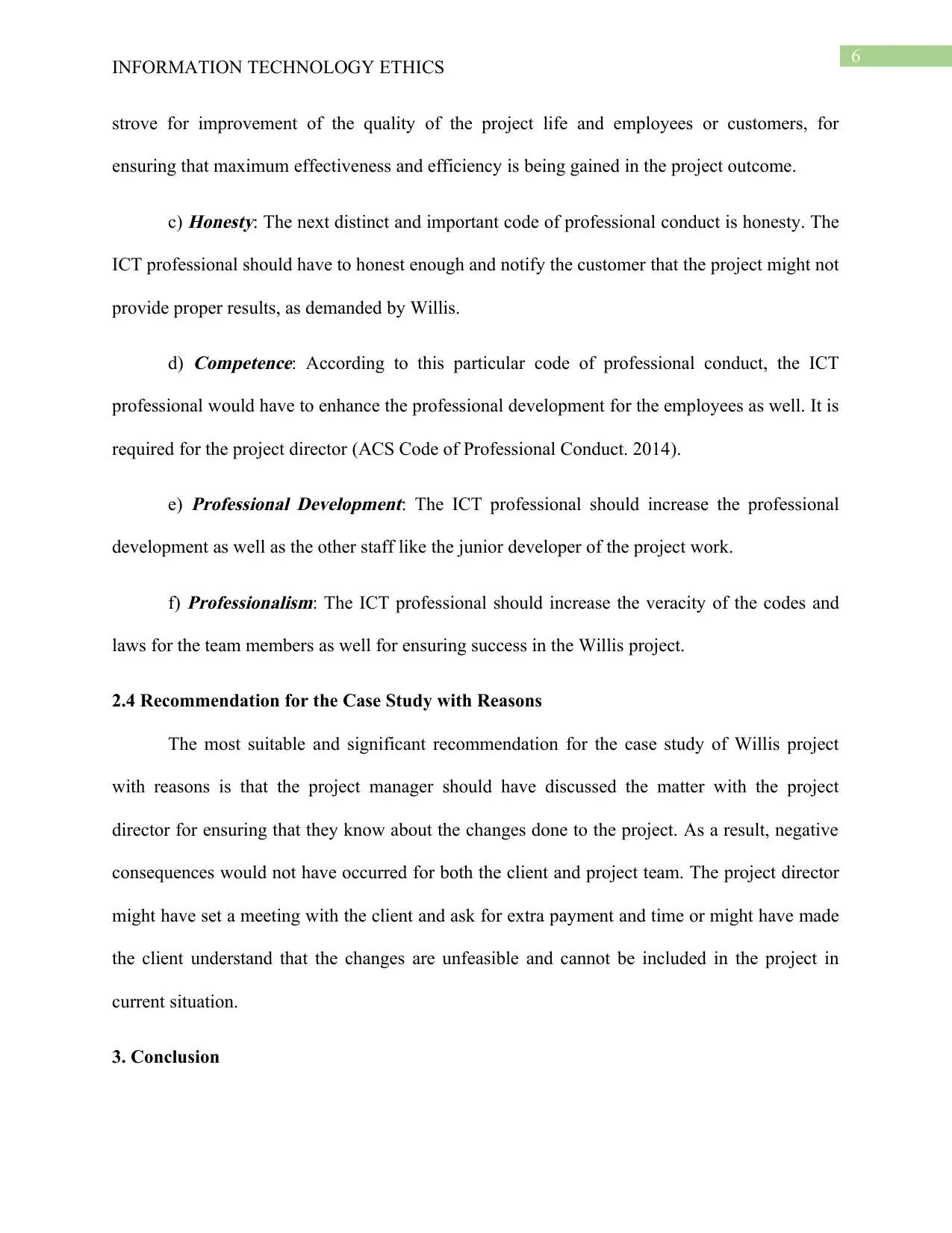
6
INFORMATION TECHNOLOGY ETHICS
strove for improvement of the quality of the project life and employees or customers, for
ensuring that maximum effectiveness and efficiency is being gained in the project outcome.
c)
Honesty: The next distinct and important code of professional conduct is honesty. The
ICT professional should have to honest enough and notify the customer that the project might not
provide proper results, as demanded by Willis.
d)
Competence: According to this particular code of professional conduct, the ICT
professional would have to enhance the professional development for the employees as well. It is
required for the project director (ACS Code of Professional Conduct. 2014).
e)
Professional Development: The ICT professional should increase the professional
development as well as the other staff like the junior developer of the project work.
f)
Professionalism: The ICT professional should increase the veracity of the codes and
laws for the team members as well for ensuring success in the Willis project.
2.4 Recommendation for the Case Study with Reasons
The most suitable and significant recommendation for the case study of Willis project
with reasons is that the project manager should have discussed the matter with the project
director for ensuring that they know about the changes done to the project. As a result, negative
consequences would not have occurred for both the client and project team. The project director
might have set a meeting with the client and ask for extra payment and time or might have made
the client understand that the changes are unfeasible and cannot be included in the project in
current situation.
3. Conclusion
INFORMATION TECHNOLOGY ETHICS
strove for improvement of the quality of the project life and employees or customers, for
ensuring that maximum effectiveness and efficiency is being gained in the project outcome.
c)
Honesty: The next distinct and important code of professional conduct is honesty. The
ICT professional should have to honest enough and notify the customer that the project might not
provide proper results, as demanded by Willis.
d)
Competence: According to this particular code of professional conduct, the ICT
professional would have to enhance the professional development for the employees as well. It is
required for the project director (ACS Code of Professional Conduct. 2014).
e)
Professional Development: The ICT professional should increase the professional
development as well as the other staff like the junior developer of the project work.
f)
Professionalism: The ICT professional should increase the veracity of the codes and
laws for the team members as well for ensuring success in the Willis project.
2.4 Recommendation for the Case Study with Reasons
The most suitable and significant recommendation for the case study of Willis project
with reasons is that the project manager should have discussed the matter with the project
director for ensuring that they know about the changes done to the project. As a result, negative
consequences would not have occurred for both the client and project team. The project director
might have set a meeting with the client and ask for extra payment and time or might have made
the client understand that the changes are unfeasible and cannot be included in the project in
current situation.
3. Conclusion
Paraphrase This Document
Need a fresh take? Get an instant paraphrase of this document with our AI Paraphraser
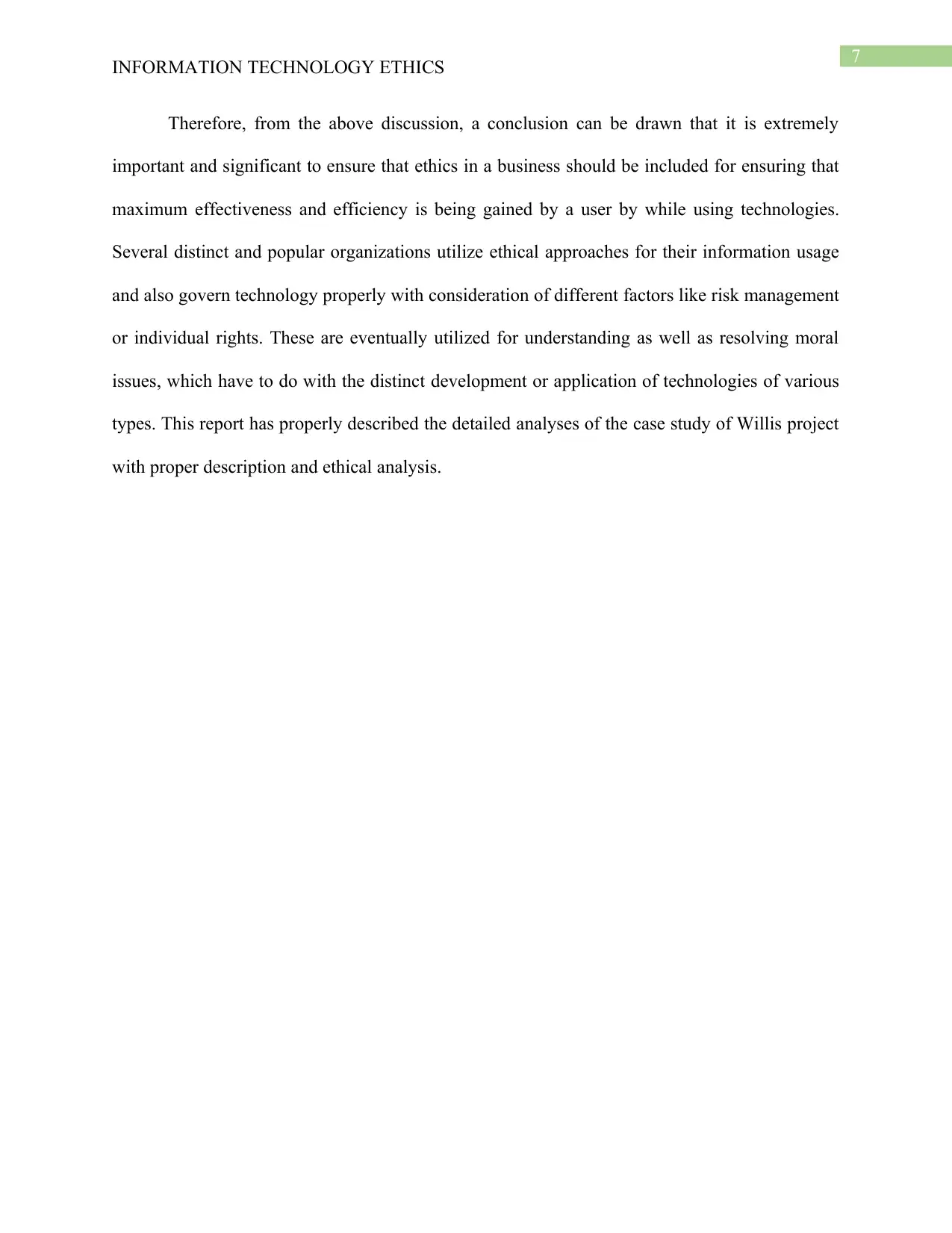
7
INFORMATION TECHNOLOGY ETHICS
Therefore, from the above discussion, a conclusion can be drawn that it is extremely
important and significant to ensure that ethics in a business should be included for ensuring that
maximum effectiveness and efficiency is being gained by a user by while using technologies.
Several distinct and popular organizations utilize ethical approaches for their information usage
and also govern technology properly with consideration of different factors like risk management
or individual rights. These are eventually utilized for understanding as well as resolving moral
issues, which have to do with the distinct development or application of technologies of various
types. This report has properly described the detailed analyses of the case study of Willis project
with proper description and ethical analysis.
INFORMATION TECHNOLOGY ETHICS
Therefore, from the above discussion, a conclusion can be drawn that it is extremely
important and significant to ensure that ethics in a business should be included for ensuring that
maximum effectiveness and efficiency is being gained by a user by while using technologies.
Several distinct and popular organizations utilize ethical approaches for their information usage
and also govern technology properly with consideration of different factors like risk management
or individual rights. These are eventually utilized for understanding as well as resolving moral
issues, which have to do with the distinct development or application of technologies of various
types. This report has properly described the detailed analyses of the case study of Willis project
with proper description and ethical analysis.
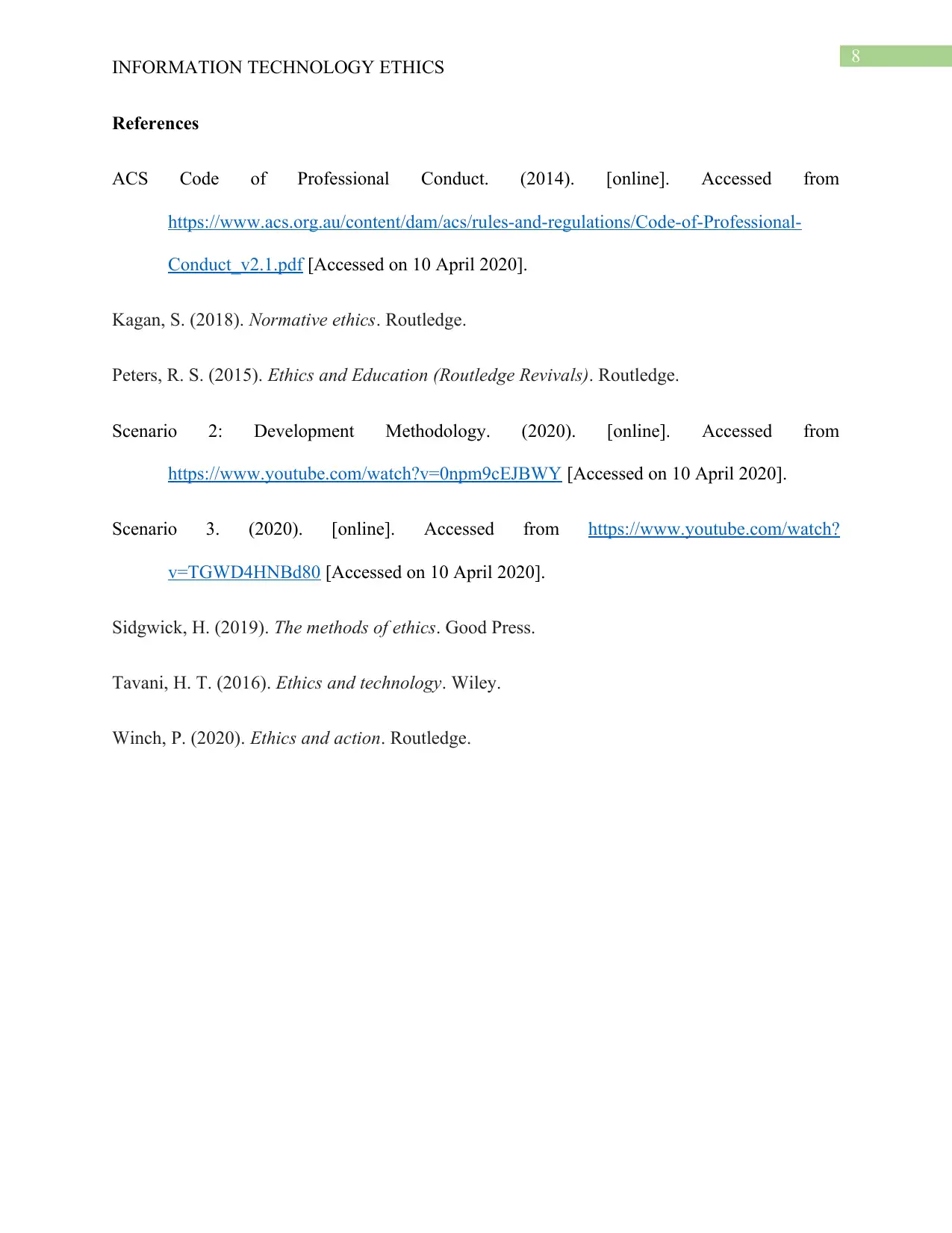
8
INFORMATION TECHNOLOGY ETHICS
References
ACS Code of Professional Conduct. (2014). [online]. Accessed from
https://www.acs.org.au/content/dam/acs/rules-and-regulations/Code-of-Professional-
Conduct_v2.1.pdf [Accessed on 10 April 2020].
Kagan, S. (2018). Normative ethics. Routledge.
Peters, R. S. (2015). Ethics and Education (Routledge Revivals). Routledge.
Scenario 2: Development Methodology. (2020). [online]. Accessed from
https://www.youtube.com/watch?v=0npm9cEJBWY [Accessed on 10 April 2020].
Scenario 3. (2020). [online]. Accessed from https://www.youtube.com/watch?
v=TGWD4HNBd80 [Accessed on 10 April 2020].
Sidgwick, H. (2019). The methods of ethics. Good Press.
Tavani, H. T. (2016). Ethics and technology. Wiley.
Winch, P. (2020). Ethics and action. Routledge.
INFORMATION TECHNOLOGY ETHICS
References
ACS Code of Professional Conduct. (2014). [online]. Accessed from
https://www.acs.org.au/content/dam/acs/rules-and-regulations/Code-of-Professional-
Conduct_v2.1.pdf [Accessed on 10 April 2020].
Kagan, S. (2018). Normative ethics. Routledge.
Peters, R. S. (2015). Ethics and Education (Routledge Revivals). Routledge.
Scenario 2: Development Methodology. (2020). [online]. Accessed from
https://www.youtube.com/watch?v=0npm9cEJBWY [Accessed on 10 April 2020].
Scenario 3. (2020). [online]. Accessed from https://www.youtube.com/watch?
v=TGWD4HNBd80 [Accessed on 10 April 2020].
Sidgwick, H. (2019). The methods of ethics. Good Press.
Tavani, H. T. (2016). Ethics and technology. Wiley.
Winch, P. (2020). Ethics and action. Routledge.
⊘ This is a preview!⊘
Do you want full access?
Subscribe today to unlock all pages.

Trusted by 1+ million students worldwide
1 out of 9
Related Documents
Your All-in-One AI-Powered Toolkit for Academic Success.
+13062052269
info@desklib.com
Available 24*7 on WhatsApp / Email
![[object Object]](/_next/static/media/star-bottom.7253800d.svg)
Unlock your academic potential
Copyright © 2020–2026 A2Z Services. All Rights Reserved. Developed and managed by ZUCOL.



